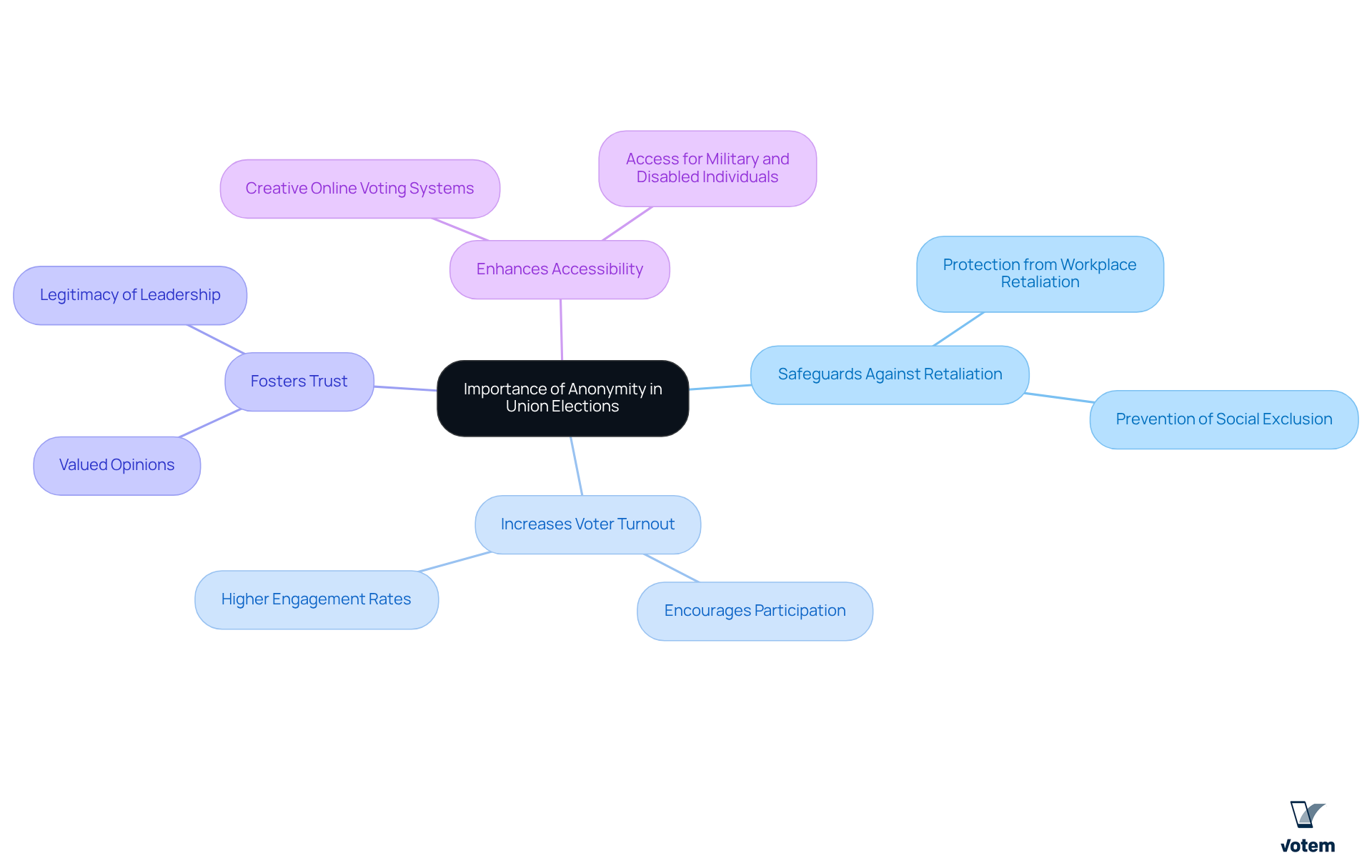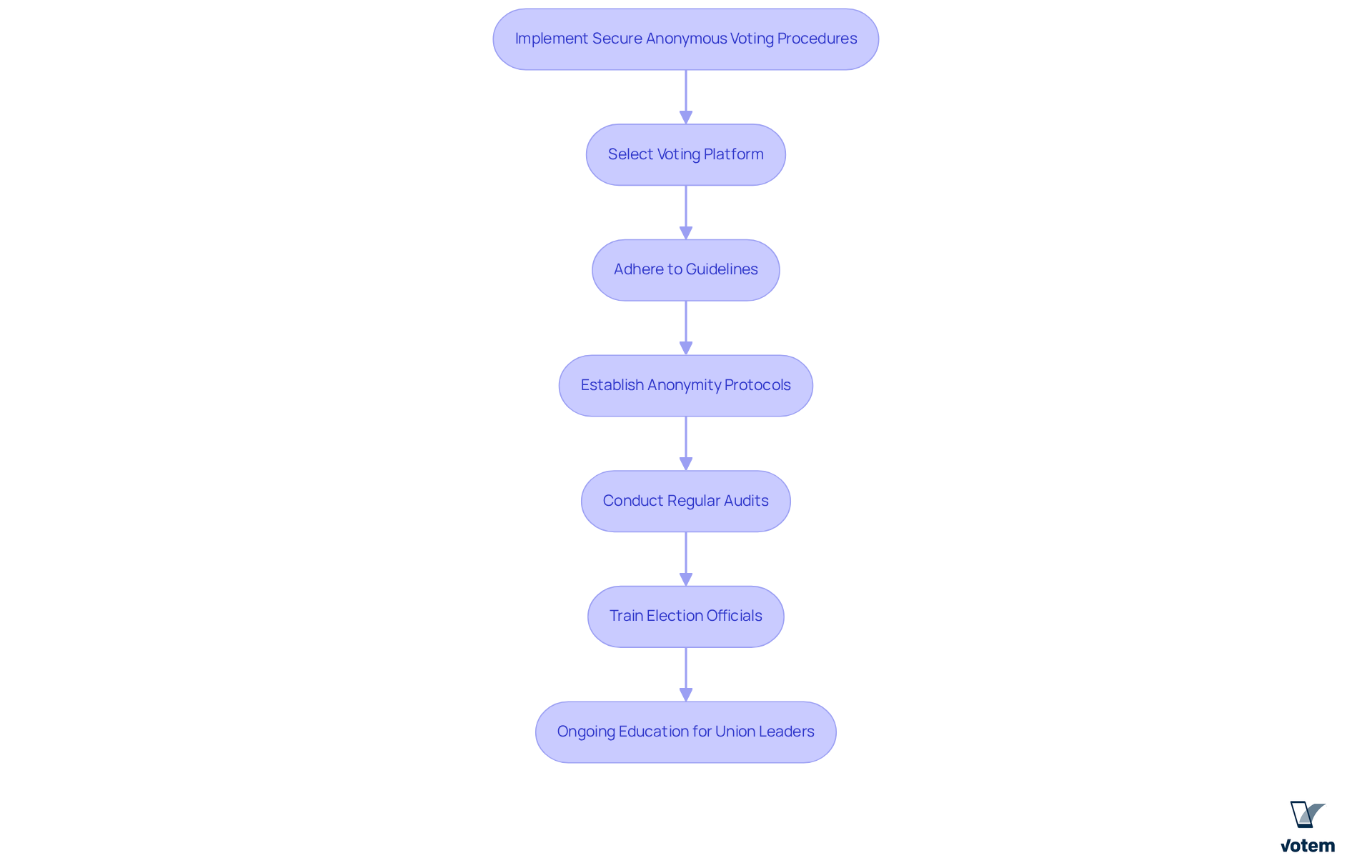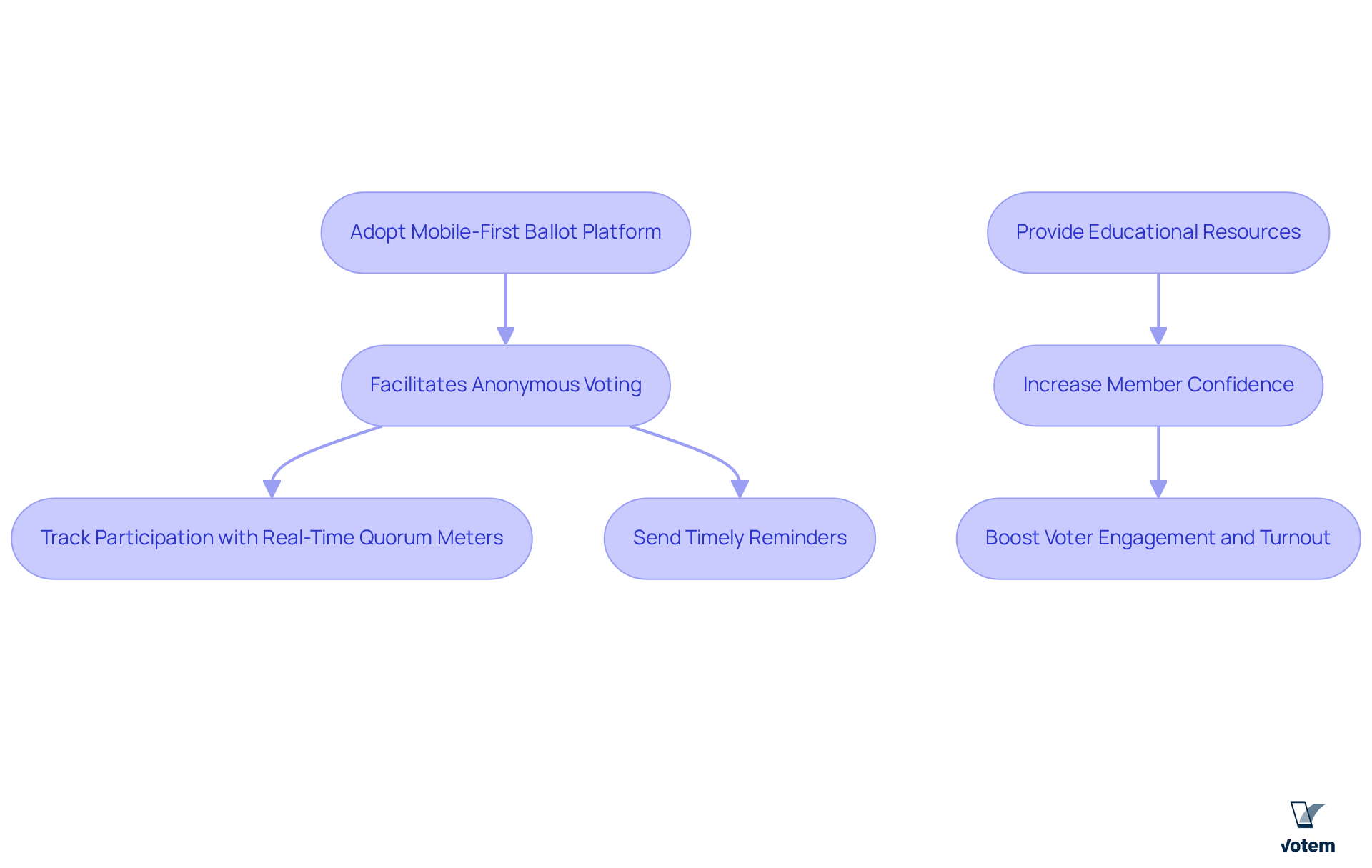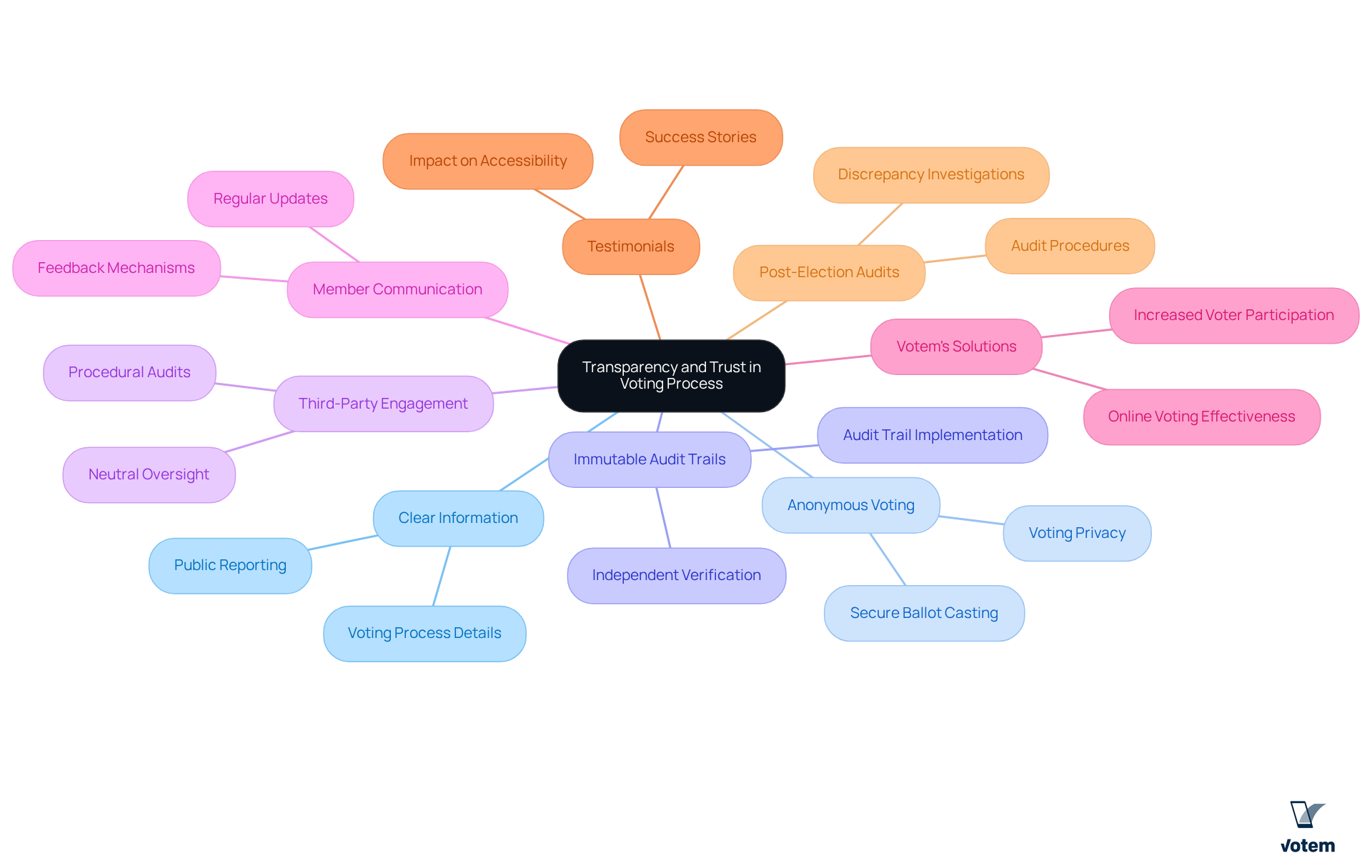Overview
Ensuring an anonymous vote in union elections is paramount for maintaining integrity and trust. Best practices include:
- Adopting secure voting platforms
- Implementing clear protocols
- Promoting transparency
These measures not only build confidence among participants but also establish a foundation for a fair electoral process. Furthermore, utilizing technology, such as encrypted online voting systems, significantly enhances both security and accessibility. This technology has proven to double voter turnout in successful past implementations, demonstrating its effectiveness. As union leadership navigates the complexities of electoral processes, embracing these strategies is essential for fostering an environment of trust and participation.
Introduction
The integrity of union elections is fundamentally rooted in the ability of members to cast their votes anonymously. This practice not only protects individuals from potential repercussions but also fosters greater participation among the membership. As unions navigate the complexities of modern electoral processes, the implementation of secure, compliant, and technologically advanced voting systems emerges as a crucial strategy.
However, a significant challenge persists: how can unions ensure that anonymity is preserved while simultaneously building trust and transparency in their voting procedures? This article delves into best practices for achieving an anonymous vote in union elections, highlighting the vital role of technology and procedural integrity in enhancing member engagement and turnout. By addressing these challenges, union leadership can create an environment that encourages active participation and upholds the democratic principles of the organization.
Understand the Importance of Anonymity in Union Elections
The importance of an anonymous vote in union elections is paramount for several reasons. It safeguards individuals from possible consequences, such as workplace retaliation or social exclusion, which can discourage involvement. When members feel secure in casting their votes through an anonymous vote without fear, they are more likely to engage in the electoral process, which leads to higher turnout rates. The introduction of creative online voting systems enhances this security by providing a contemporary framework that increases access for all eligible participants, including military members and individuals with disabilities. Linda McCulloch emphasized the introduction of this system as a notable achievement, remarking that it enabled broader access for all eligible voters.
Additionally, the concept of an anonymous vote fosters a sense of trust in the electoral system, as members believe their opinions are valued and protected. This trust is crucial for the legitimacy of the union’s leadership and decision-making methods. Furthermore, ensuring an anonymous vote aligns with the principles of democratic governance, reinforcing the idea that every anonymous vote counts and should be free from external pressures or influences. The company’s dedication to improving accessibility and security in electoral processes further supports this crucial element of union elections, as demonstrated by the New Mexico State Republican Party’s satisfaction with the software’s performance.

Implement Secure and Compliant Anonymous Voting Procedures
To establish secure and compliant anonymous vote procedures, unions must adopt a comprehensive strategy that prioritizes accessibility for all participants. Begin by selecting a platform for elections that emphasizes security and anonymity, such as Votem’s CastIron platform, which ensures an anonymous vote by encrypting ballots both in transit and at rest. This innovative platform not only enhances security but also simplifies the voting process and increases accessibility, enabling participants to engage from anywhere—whether at home, in the office, or on the move.
Adhering to the guidelines set by the National Credit Union Administration (NCUA) and the Department of Labor (DOL) is essential; these organizations mandate that all electoral methods, such as an anonymous vote, maintain the integrity and confidentiality of participant choices. Establish clear protocols for identifying individuals that protect anonymity to facilitate an anonymous vote, such as utilizing unique identification codes instead of personal information. Regular audits of the voting process are crucial to identify and address any vulnerabilities, ensuring ongoing compliance and security. Furthermore, training election officials on these procedures is vital, as it equips them with the necessary knowledge to uphold confidentiality during the election cycle.
Ongoing education for union leaders is equally critical, as it empowers them to adapt to evolving electoral landscapes and reinforces the importance of compliance. By prioritizing these practices, unions can significantly enhance public trust and participation, ultimately leading to more robust electoral outcomes. Notably, Votem’s CastIron platform has demonstrated its effectiveness by achieving a remarkable increase in participation, with past implementations resulting in over 123,000 ballots cast—more than double the turnout of previous elections—underscoring the benefits of employing secure and compliant electoral solutions.

Leverage Technology to Enhance Voter Engagement and Turnout
Technology is crucial in enhancing participant engagement and turnout by facilitating an anonymous vote in union elections. By adopting a mobile-first ballot platform, unions can significantly boost participation, enabling an anonymous vote that allows members to conveniently cast their votes from smartphones or tablets. Features such as real-time quorum meters enable organizers to track participation levels and send timely reminders, effectively encouraging turnout. Furthermore, providing educational resources through digital channels demystifies the voting process, instilling confidence in members to participate. This platform exemplifies this approach, offering user-friendly interfaces and accessibility features that cater to all participants, ensuring inclusivity.
As noted by Linda McCulloch, the introduction of this modern system has enabled broader access for all eligible individuals, including military personnel and those with disabilities, representing a notable achievement in improving electoral accessibility. The platform has also effectively managed the receipt of 299,000 votes for the National Radio Hall of Fame, as emphasized by Kraig Kitchin, showcasing its capability to handle large-scale balloting securely. Votem further delivered 123,000 votes in New Mexico, more than double the turnout of the last election in 2015, demonstrating its effectiveness in increasing voter participation.
Adopting technology not only simplifies the election procedure but also fosters a culture of involvement and openness through the use of anonymous vote within unions. The evidence is clear: integrating such platforms is essential for modernizing the electoral process and ensuring that every voice is heard.

Ensure Transparency and Build Trust in the Voting Process
To ensure transparency and build trust in the election system, unions must adopt practices that promote openness, accountability, and the use of an anonymous vote. This entails providing clear information about the voting process, including how an anonymous vote is cast, counted, and reported. By utilizing an immutable audit trail, similar to those offered by advanced platforms, independent verification of election outcomes is possible, thereby enhancing credibility.
A testimonial underscores this point: “Implementing the new, modern system which allowed greater access for all qualified individuals from military personnel to those with disabilities was my greatest accomplishment in office.”
Votem’s innovative online voting solutions have demonstrated effectiveness in increasing voter participation, as evidenced by the successful handling of 299,000 votes for the National Radio Hall of Fame, marking a significant increase from previous years.
A robust post-election audit, which includes an anonymous vote, can bolster confidence in election results, as noted by the NCSL. Furthermore, engaging neutral third parties in the election procedures to supervise and confirm methods can alleviate concerns regarding bias or manipulation, particularly in the context of an anonymous vote, as shown by procedural audits conducted in states like South Carolina and Michigan.
Consistently informing members about election procedures and results fosters a culture of openness, which enhances trust in the outcomes of an anonymous vote and motivates active participation. However, it is crucial to recognize that implementing these transparency measures can be time-consuming and labor-intensive. By prioritizing transparency and leveraging Votem’s solutions, unions can fortify their democratic processes and reinforce member confidence in their leadership.

Conclusion
Ensuring an anonymous vote in union elections is essential for fostering participation and trust among members. The integrity of the electoral process hinges on individuals’ ability to express their preferences without fear of repercussions. By implementing secure and compliant voting procedures, unions can create an environment where every member feels empowered to engage in the democratic process. This ultimately leads to stronger representation and decision-making.
The article highlights several key practices that contribute to effective anonymous voting. These include:
- The adoption of secure online platforms
- Adherence to regulatory guidelines
- The importance of transparency in the voting process
By leveraging technology to enhance accessibility, unions can significantly increase voter turnout and engagement. Furthermore, incorporating educational resources and real-time tracking features can demystify the voting process, encouraging more members to participate.
In a landscape where member trust is crucial, unions must prioritize the implementation of these best practices. By fostering an environment of transparency and accountability, and utilizing modern voting solutions, unions can not only enhance participation but also reinforce the legitimacy of their electoral outcomes. Embracing these strategies will ensure that every voice is heard, paving the way for a more inclusive and democratic union environment.
Frequently Asked Questions
Why is anonymity important in union elections?
Anonymity in union elections is important because it protects individuals from potential consequences like workplace retaliation or social exclusion, encouraging greater participation and higher turnout rates.
How does anonymous voting affect voter participation?
When members feel secure in casting their votes anonymously, they are more likely to engage in the electoral process, leading to increased voter turnout.
What improvements have been made to enhance the security of voting in union elections?
The introduction of creative online voting systems has improved security and accessibility for all eligible participants, including military members and individuals with disabilities.
Who highlighted the importance of the new voting system?
Linda McCulloch emphasized the significance of the new voting system, noting that it enabled broader access for all eligible voters.
How does anonymous voting contribute to trust in the electoral system?
Anonymous voting fosters trust among members, as they believe their opinions are valued and protected, which is crucial for the legitimacy of the union’s leadership and decision-making processes.
Why is trust in the electoral system vital for unions?
Trust is vital for the legitimacy of the union’s leadership and decision-making methods, as it reinforces the idea that every anonymous vote counts and is free from external pressures or influences.
What is the company’s commitment regarding electoral processes?
The company is dedicated to improving accessibility and security in electoral processes, as evidenced by positive feedback from organizations like the New Mexico State Republican Party regarding the software’s performance.
List of Sources
- Implement Secure and Compliant Anonymous Voting Procedures
- NCUA Releases Second Quarter 2025 Credit Union System Performance Data (https://ncua.gov/newsroom/press-release/2025/ncua-releases-second-quarter-2025-credit-union-system-performance-data)
- 5 Strategies for Effective Election Compliance in Unions | Online Voting with Votem® (https://votem.com/5-strategies-for-effective-election-compliance-in-unions)
- Electing Union Officers Using Remote Electronic Voting Systems (https://dol.gov/agencies/olms/compliance-assistance/tips/remote-electronic-voting-systems)
- Leverage Technology to Enhance Voter Engagement and Turnout
- How to Improve Voter Turnout and Build Power in Historically Marginalized Communities (https://blog.ucs.org/michael-latner/how-to-improve-voter-turnout-and-build-power-in-historically-marginalized-communities)
- Improving Trade Union Election Transparency – ElectionBuddy (https://electionbuddy.com/blog/2024/06/24/improving-trade-union-election-transparency)
- Internet voting in Estonia 2005–2019: Evidence from eleven elections (https://sciencedirect.com/science/article/pii/S0740624X2200051X)
- Union Voting: The Election Platform for Unifying Your Union Members! – ElectionBuddy (https://electionbuddy.com/customers/unions)
- Empowering Fair And Inclusive Elections: How AI Is Shaping The Future Of Democracy In Africa | AUDA-NEPAD (https://nepad.org/blog/empowering-fair-and-inclusive-elections-how-ai-shaping-future-of-democracy-africa)
- Ensure Transparency and Build Trust in the Voting Process
- Quotations about Democracy (https://civiced.org/quotations-about-democracy)
- Post-Election Audits (https://ncsl.org/elections-and-campaigns/post-election-audits)

